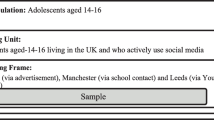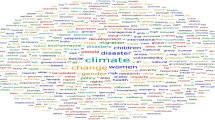Abstract
There is a pressing need to find ways to communicate information about climate change effectively and in terms that resonate with diverse audiences. We conducted a survey-experiment to evaluate how textual and visual frames that highlight coastal flooding in two major US cities as a result of future sea level rise shape individuals’ perceptions about the effects on coastal communities, concern for these places, and belief in climate change’s existence. We build on extant literature by focusing on the impact of an understudied frame using animated maps that illustrate future flooding that will occur as global temperatures rise. We find that exposure to such messages increases perceptions that sea level rise will have negative impacts on coastal communities, concern for these communities, and belief in climate change.


Similar content being viewed by others
References
Berinsky AJ, Huber GA, Lenz GS (2012) Evaluating online labor markets for experimental research: Amazon. com’s mechanical turk. Polit Anal 20(3):351–368
Bolsen T, Druckman JN (Forthcoming) Do partisanship and politicization undermine the impact of a scientific consensus message about climate change? Group Process Intergr Relat
Bolsen T, Druckman JN, Cook FL (2015) Citizens’, scientists’, and policy advisors’ beliefs about global warming. An Am Acad Pol Soc Sci 658:271–295
Bolsen T, Shapiro, M (Forthcoming) Strategic framing and persuasive messaging to influence climate change perceptions and decisions. Oxford Encyclopedia of Climate Change Communication
Chong D, Druckman JN (2007) A theory of framing and opinion formation in competitive elite environments. Aust J Commun 57:99–118
Druckman JN (2011) The implications of framing effects for citizen competence. Polit Behav 23:225–256
Druckman JN (2015) Communicating policy-relevant science. Perspect Politics 48:58–69
Druckman JN, Kam CD (2011) Students as experimental participants: a defense of the ‘narrow data base.’ In James N. Druckman, Donald P. Green, James H. Kuklinski, and Arthur Lupia, (eds.), Handbook of Experimental Political Science
Feldman L, Hart PS, Milosevic T (2015) Polarizing news? Representations of threat and efficacy in leading US newspapers’ coverage of climate change. Public Underst Sci:1–17
Gillis J (2016) Flooding of coast, caused by global warming, has already begun. The New York Times. Accessed September 3 at: http://nyti.ms/2c9EXZQ
Hart PS, Feldman L (2016) The impact of climate change–related imagery and text on public opinion and behavior change. Sci Commun 38:415–441
Hart PS, Nisbet EC (2012) Boomerang effects in science communication: how motivated reasoning and identity cues amplify opinion polarization about climate mitigation policies. Comm Res 39:701–723
IPCC Fifth Assessment Report (2014) (AR5) (Cambridge Univ Press)
Kahan DM (2015) Climate-science communication and the measurement problem. Polit Psychol 36:1–43
Kahan DM, Carpenter K (2017) Out of the lab and into the field. Nat Clim Chang 7:309–311
Kahan DM, Peters E, Wittlin M, Slovic P, Ouellette LL, Braman D, Mandel G (2012) The polarizing impact of science literacy and numeracy on perceived climate change risks. Nat Clim Chang 2:732–735
Leiserowitz AA (2006) Climate change risk perception and policy preferences: the role of affect, imagery, and values. Clim Chang 77:45–72
Levay KE, Freese J, Druckman JN (2016) The demographic and political composition of mechanical Turk samples. Sage Open 6(1):2158244016636433
Levine AS, Kline R (2017) A new approach for evaluating climate change communication. Clim Chang 142:301–309
Lewandowsky S, Gignac GE, Vaughan S (2013) The pivotal role of perceived scientific consensus in acceptance of science. Nat Clim Chang 3:399–404
Lorenzoni I, Leiserowitz A, Doria MD, Poortinga W, Pidgeon NF (2006) Cross-national comparisons of image associations with global warming and climate change among laypeople in the United States of America and Great Britain. J Risk Res 9:265–281
Lorenzoni I, Nicholson-Cole S, Whitmarsh L (2007) Barriers perceived to engaging with climate change among the UK public and their policy implications. Glob Environ Chang 17:445–459
Maibach EW, Nisbet M, Baldwin P, Akerlof K, Diao G (2010) Reframing climate change as a public health issue: an exploratory study of public reactions. BMC Public Health 10:299.
Manzo K (2010) Beyond polar bears? Re-envisioning climate change. Meteorol Appl 17:196–208
McCright AM, Charters M, Dentzman K, Dietz T (2016) Examining the effectiveness of climate change frames in the face of a climate change denial counter-frame. Top Cogn Sci 8:76–97
McCright AM, Dunlap RE (2011) The politicization of climate change and polarization in the American public’s views of global warming, 2001–2010. Am Soc Quart 52:155–194
Moser SC (2010) Communicating climate change: history, challenges, process and future directions. Wiley Interdiscip Rev Clim Chang 1:31–53
Mullinix KJ, Leeper TJ, Druckman JN, Freese J (2015) The generalizability of survey experiments. J Exp Polit Sci 2(2):109–138
Myers TA, Nisbet MC, Maibach EW, Leiserowitz A (2012) A public health frame arouses hopeful emotions about climate change. Clim Chang 113:1105–1112
Nisbet MC (2009) Communicating climate change: why frames matter for public engagement. Environ: Sci Policy Sustain Dev 51:12–23
Nisbet EC, Hart PS, Myers T, Ellithorpe M (2013) Attitude change in competitive framing environments? Open-/closed-mindedness, framing effects, and climate change. Aust J Commun 63:766–785
O’Neill S (2013) Image matters: climate change imagery in US, UK and Australian newspapers. Geoforum 49:10–19
O’Neill SJ, Boykoff M, Niemeyer S, Day SA (2013) On the use of imagery for climate change engagement. Glob Environ Chang 23:413–421
O’Neill SJ, Nicholson-Cole (2009) ‘Fear won’t do it’: promoting positive engagement with climate change through visual and iconic representations. Sci Commun 30:355–379
O’Neill SJ, Smith N (2014) Climate change and visual imagery. WIREs Clim Change 5:73–87
O’Neill S, Williams HT, Kurz T, Wiersma B, Boykoff M (2015) Dominant frames in legacy and social media coverage of the IPCC fifth assessment report. Nat Clim Chang 5:380–385
Palm R, Lewis GB, Feng B (2017) What causes people to change their opinion about climate change? Ann Am Assoc Geogr 107:883–896
Pidgeon N, Fischhoff B (2011) The role of social and decision sciences in communicating uncertain climate risks. Nat Clim Chang 1(1):35–41
Retchless DP (2017) Understanding local sea level rise risk perceptions and the power of maps to change them: the effects of distance and doubt. Environ Behav 1–29
Scannell L, Gifford R (2013) Personally relevant climate change: the role of place attachment and local versus global message framing in engagement. Environ Behav 45:60–85
Shaw A, Sheppard S, Burch S, Flanders D, Wiek A, Carmichael J, Robinson J, Cohen S (2009) Making local futures tangible—synthesizing, downscaling, and visualizing climate change scenarios for participatory capacity building. Glob Environ Chang 19:447–463
Sheppard SRJ (2005) Landscape visualisation and climate change: the potential for influencing perceptions and behavior. Environ Sci Pol 8:637–654
Sheppard SRJ, Shaw A, Flanders D, Burch S, Wiek A, Carmichael J, Robinson J, Cohen S (2011) Future visioning of local climate change: a framework for community engagement and planning with scenarios and visualisation. Futures 43:400–412
Van der Linden SL, Leiserowitz AA, Feinberg GD, Maibach EW (2014) How to communicate the scientific consensus on climate change: plain facts, pie charts or metaphors? Clim Chang 126:255–262
Van der Linden SL, Leiserowitz AA, Rosenthal S, Maibach E (Forthcoming) Inoculating the public against misinformation about climate change. Global Challenges
Wood D, Vedlitz A (2007) Issue definition, information processing, and the politics of global warming. Am J Polit Sci 51:552–568
Zia A, Todd A (2010) Evaluating the effects of ideology on public understanding of climate change science: how to improve communication across ideological divides. Public Underst Sci 19:743–761
Author information
Authors and Affiliations
Corresponding author
Electronic supplementary material
ESM 1
(DOCX 11407 kb)
Rights and permissions
About this article
Cite this article
Bolsen, T., Kingsland, J. & Palm, R. The impact of frames highlighting coastal flooding in the USA on climate change beliefs. Climatic Change 147, 359–368 (2018). https://doi.org/10.1007/s10584-018-2143-0
Received:
Accepted:
Published:
Issue Date:
DOI: https://doi.org/10.1007/s10584-018-2143-0




